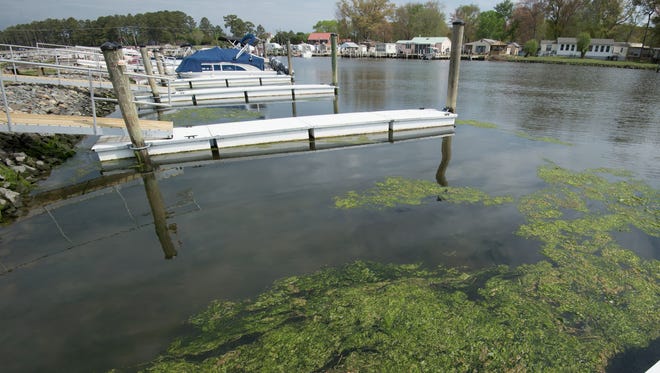Lawmakers propose fee to help clean Delaware's water
Delaware needs to invest more in cleaning up its rivers, lakes and other waterways, said a state task force, which proposed making Delawareans pay $40 to $80 a year to fund it.

"If clean water loses, our health and our economy lose," said Sen. Bryan Townsend, D-Newark, co-chair of the Clean Water Task Force. Its report was issued Monday
The group wants to add up to $40 to Delawareans’ income taxes and apply a $45 surcharge to business license fees. That would raise an estimated $20 million every year to pay for pollution cleanup and better infrastructure.
CONTEXT: The debate over taxes in Delaware
The task force was created in 2015 to research Delaware's water quality and come up with proposals to improve it. It had 30 members, including legislators, state officials, environmental advocates and business and agriculture leaders.
About 90 percent of the state's waterways are impaired by some form of pollution, the task force said.
Pollution doesn't just mean chemicals and toxins from factories or sewers, though those things are still a problem in places like the Christina River or Red Clay Creek.
A more widespread issue is nutrient runoff, which is when fertilizers, animal waste and other substances wash into the water during heavy rains or flooding. The nitrogen and phosphorus fuel aquatic plant growth and, as the plants die and break down, they deplete oxygen in the water.
BACKGROUND: Clean water has been an issue for years
Runoff can also fuel microscopic algae blooms. Some algae release ricin, which is harmful to fish and humans.
Delaware also faces a growing risk of flooding, given its low elevation and rising sea levels.
The task force notes that these issues can pose a health risk, and they can also interfere with vital parts of Delaware's tourism economy. For example, runoff into the ocean at Rehoboth Beach can cause bacteria growth that leads to swimming advisories, and algae blooms can interfere in boating and fishing in Sussex County's inland bays.
Experts say the tools to clean up waterways are already well known, whether it's activated carbon that can soak up toxins, cover crops that limit outflow from farms or permeable sidewalks that reduce runoff.
"We have the tools, we have the knowledge," said Gerald Kauffman, director of the Water Resource Center at the University of Delaware and a task force member. "We just need money to do it."
The task force found that federal funding for clean water initiatives has remained largely stagnant, while state funding has been inconsistent.
To create a more sustainable way to pay for water improvements, the task force has recommended legislation that would impose a surcharge on income taxes and business licenses. Income taxpayers would pay an additional 10 percent of their net liability, but would not pay more than $40 if filing individually or $80 if filing jointly.
Those obtaining business licenses would pay $45 extra.
The task force estimates this would raise $20 million each year that would go into a Clean Water Trust, which could only be used for water projects. The trust would be managed by a panel of cabinet secretaries that would be empowered to issue bonds.
Townsend said he and the other co-chair, Rep. Michael Mulrooney, D-Penwood, plan to introduce their plan this year. But he acknowledges it might not pass immediately.
The General Assembly is already mulling other tax increases this year to fix state government's almost $400 million budget gap.

"If the will is there to do it this year, I'm all for that," Townsend said. "We understand that we can expect colleagues and the public to take a very thorough look at this."
Rep. Ron Gray, R-Selbyville, was also a task force member. He agrees that Delaware should be doing more to clean up its waterways — for example, in centralizing sewer systems in Sussex County, where individual septic systems can leak into the environment.
"We need to have safe drinking water. That's one of the basics," Gray said. "I don't think there's anyone who disagrees that we've got to have clean water."
Still, Gray said he's not sure he can support the tax increases.
"I'm not sure it's the right thing for us to do at this time," he said.
The task force report comes three years after former Gov. Jack Markell called for increasing property taxes to the tune of $30 million each year for clean water initiatives. Markell repeatedly called the state of Delaware's waterways embarrassing, but his proposal went nowhere in the General Assembly.
Townsend argues the new plan is more palatable because it spreads the cost of paying for clean water more broadly and avoids massive increases to large property owners, particularly farmers.
"We need to understand the collective impact we're all having on our water," Townsend said. "We all have a role in this. We're all part of the problem and we all need to be part of the solution."
Reporter Molly Murray contributed to this story.
Contact Matthew Albright at malbright@delawareonline.com, (302) 324-2428 or on Twitter @TNJ_malbright.